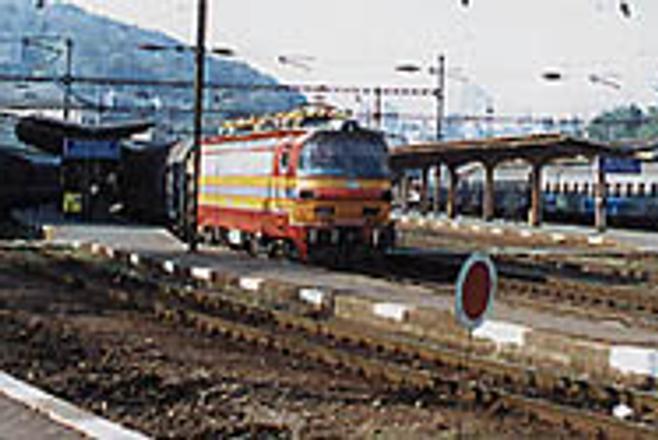A dispute between the cabinet and railway unions over job cuts promises to be the first of many as Slovakia restructures its corporate sector.photo: Ján Svreek
The government and unions have disagreed bitterly over a transformation plan for rail monopoly ŽSR (Železnice Slovenskej Republiky) approved by cabinet October 18 that will see between 12,000 and 16,000 employees laid off over the next five years. The government has said that the massive lay-offs are a crucial part of ŽSRos future restructuring.
The transformation process is aimed at revitalising the heavily indebted rail company and attracting a foreign investor for the firm. The process will start in July next year and will cost 1.1 billion crowns ($21.2 million), 950 million of which will be provided by the European Investment Bank in compensation to laid-off ŽSR employees. The rest will be covered by the government.
The plans were strongly criticised by unions, which said that the mass redundancies were unnecessary. "[The] transformation as proposed by the government would result in the collapse of ŽSR. From our perspective, the structure of the company as it is proposed in the plans will mean a decline of ŽSR and catastrophe for its employees," said ŽSR union chief Vladimír Pikna.
However, government officials said that the restructuring plans for the company were far from destructive. They explained that the redundancies would improve economic performance at ŽSR, something essential for the company's future development. "All this [economic improvement of the company] is conditioned by a decrease in the number of ŽSR employees," said Dušan Turanovie, head of the rail section at the Ministry of Transport, Post and Telecommunications.
Analysts said that the while the government had to take into account a politically sensitive situation in laying off so many workers, the plans were economically best for ŽSR. "Transformation at ŽSR is a delicate political issue, as a considerable number of employees will lose their jobs. The closer Slovakia is to parliamentary elections, the less politicians are willing to support documents which stress such a significant release of employees," said Daniela Lichvarová, head analyst of the investment banking department at state-owned bank SLSP.
She added, though, that unions had been blocking approval of the transformation document for so long that the situation had finally reached the point that it was costing the government more money to delay the project than actually implement the restructuring.
Under the scheme, ŽSR would be split into two companies: ŽSR a.s., which will be the main operator of cargo and passenger transport, and Železnižná Spoloenos?, which will run the infrastructure and railtrack services such as an information centre, railway healthcare and a research and development centre.
Pikna said that the document's main shortcoming was that the release of 16, 000 of ŽSR's current 48,000 employees - the railway is the biggest employer in the country - would endanger the rail network's safety as ŽSR infrastructure standards had already fallen behind western European standards. "Many redundant people who they [the government] want to lay off perform important [safety] operations. If they fire them and don't have automatic systems which would replace these people, it will decrease security on the rails," Pikna said.
But Turanovie rejected such assertions, saying that the government would only lay off ŽSR employees when technical equipment throughout the railway network improved. According to ŽSR spokesperson Miloš Eikovský, ŽSR will invest more than 80 billion crowns [$1.5 billion] into improvement of its infrastructure and technical equipment in the next 10 years.
Lichvarová said the government had become tired of supporting ŽSR through guaranteed loans and would like the company to become more viable without emptying the government's coffers. "Right now, it's plainly over-employed," Lichvarová said.
ŽSR made a loss of 1.67 billion crowns [$32.2 million] over the first nine months of 2000. The utility has to pay back loans to banks to the tune of of 40 billion crowns [$77.2 million], most of them guaranteed by the state. To decrease ŽSR's debt the government will use 710 million crowns [$13.7 million] from privatisation revenues. However, the government itself still owes ŽSR almost 15 billion crowns [$289 million] in state subsidies for public transport, 10 billion [$193 million] of which will be paid before the end of 2005.
According to Lichvarová, ŽSR will eventually be partially privatised, if only because the government cannot in the long-term afford to support the company financially. "ŽSR will have to make investments in order to catch up with other European countries in terms of connections and good quality equipment. This will have to be carried out by a strategic partner rather than the state," Lichvarová said.


